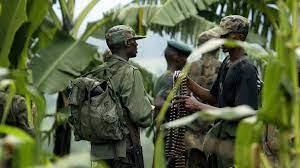

Rwandan authorities have rebuffed U.S. demands for the withdrawal of troops and missile systems from eastern Congo, asserting that their military presence is necessary to safeguard Rwandan territory. The Rwandan Foreign Ministry issued a statement on Monday, citing concerns over a “dramatic military build-up” by Congo near the border, which they perceive as a threat to national security.
The statement from Rwanda highlighted the presence of the rebel group known as the Democratic Forces for the Liberation of Rwanda (FDLR) in Congo.
According to the Foreign Ministry, FDLR members, alleged perpetrators of the 1994 genocide, are “fully integrated into” the Congolese army. However, this is a departure from previous claims by Rwandan authorities, who had not openly acknowledged a military presence in eastern Congo.
The U.S. State Department, in a statement on Saturday, criticized the escalating violence caused by the M23 armed group, describing it as “Rwanda-backed.”
The U.S. urged Rwanda to “immediately withdraw all Rwanda Defense Force personnel” from Congo and dismantle its surface-to-air missile systems.
Rwanda responded by questioning the U.S.’s credibility as a mediator in Africa’s Great Lakes region, considering the apparent shift in policy or lack of internal coordination.
Previous reports by U.N. experts had provided “solid evidence” of Rwanda’s armed forces operating in support of M23.
The rebellion led by M23 has resulted in the displacement of hundreds of thousands of people in Congo’s North Kivu province in recent years, with heightened fighting near Goma, the largest city in the region.
more recommended stories
 Somaliland to Defend Sovereignty Against Somalia’s Provocative Laascaanood Visit
Somaliland to Defend Sovereignty Against Somalia’s Provocative Laascaanood VisitThe Ministry of Foreign Affairs and.
 New Director Appointed: Burao Hospital’s Fall and the Fight for Revival
New Director Appointed: Burao Hospital’s Fall and the Fight for RevivalBurao Hospital begins a new chapter.
 Somaliland: While Mogadishu Burns, Somalia Seeks Chaos in Sool
Somaliland: While Mogadishu Burns, Somalia Seeks Chaos in SoolHargeisa, April 9, 2025 – (Somaliland.com).
 Somaliland Presidency Delivers 10 Vital Dialysis Machines to Hargeisa Group Hospital
Somaliland Presidency Delivers 10 Vital Dialysis Machines to Hargeisa Group HospitalHargeisa – Somaliland – The President.

